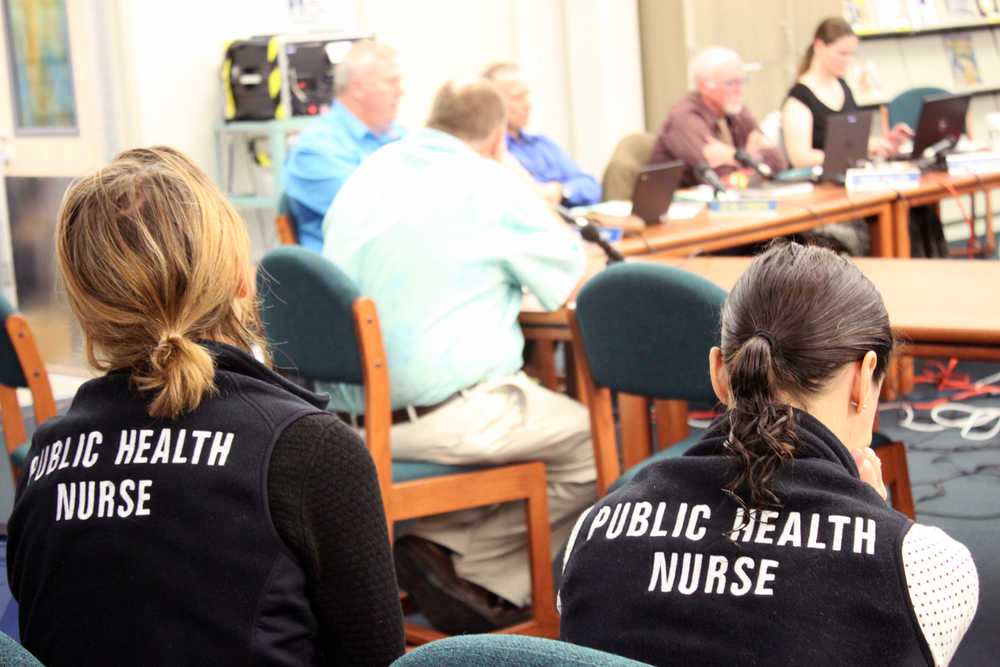An educator from Planned Parenthood, nine Juneau public heath nurses and two AWARE educators. These individuals need to be approved by the Juneau School Board before they can teach sex education in a classroom — a new mandate under House Bill 156.
“I personally am frustrated with this bill and how some legislators are using legislation to put barriers to one of the most important topics that our adolescent students need for no other reason than to push an agenda that is the equivalent to putting their head in the sand and pretending sex and teenagers do not exist,” school board member Josh Keaton said during Tuesday’s regular school board meeting.
Gov. Bill Walker allowed HB 156, touted as a parental rights bill and sponsored by Rep. Wes Keller, R-Wasilla, with amendments from Sen. Mike Dunleavy, R-Wasilla, to pass without a signature. It becomes law on Oct. 26.
Some of the Juneau educators on the list were at Tuesday’s meeting in case the board had questions for them.
“These are agencies that we’ve partnered with for a long time,” Ted Wilson, the district’s director of teaching and learning, told the board.
“It had been our practice that when classroom teachers are wanting someone to come in to provide more expert information — whether it be about sex education, or about science or art or culture — that they invite those folks in and they supervise what’s being taught in the classrooms,” he continued.
HB 156 requires the additional step of the school board approving the list of educators for sex education, human reproductive education and human sexuality education. Wilson also included the curriculums they use and what their credentials are — information the board is required to make available to the public under the law.
Keaton said he had “zero issues” with anything on the list.
“I reviewed curriculum materials and I reviewed all the materials that are being taught in the classroom and there wasn’t one topic that I found to be biased and not factually based,” he said.
In presenting the list, Wilson said he’s being extra cautious. For instance, not all nine public health nurses have actually gone into the classroom, “but to err on the side of not coming back to the board constantly, we listed everybody who could potentially be in the classroom,” Wilson explained.
The AWARE educators listed don’t even teach sex education — they teach personal safety — so they would be exempt from HB 156, Wilson said.
“However, there is that potential that at some point, a question could be asked by a student or just the perception from the public that there could be some kind of conversation that could take place, so the AWARE folks have agreed that out of the abundance of caution that we will also approve them,” he said.
Board member Barbara Thurston clarified that the board is being asked to approve the individuals on the list and not the agencies they work for. Once given, Wilson said the approval lasts indefinitely.
Juneau schools are teaching sex education, human reproductive education and human sexuality education under a health curriculum adopted in 2007. A committee will soon start work on a new health curriculum that is scheduled for adoption by the board this spring.
“Under the framework of the law, whenever we have a change of folks, we’re going to need to come back and go through an approval process and if we decide to change the curriculum, we would need to do the same thing,” Wilson said.
Tuesday night was the board’s first reading of the agenda item. No one from the public commented, but there will be another opportunity to do so at the next regular meeting Oct. 19 when the board will take final action in approving the list.
Referring to the approval process in general, board member Emil Mackey said, “It’s totally ridiculous that we have to do this.”
• Contact reporter Lisa Phu at 523-2246 or lisa.phu@juneauempire.com.

